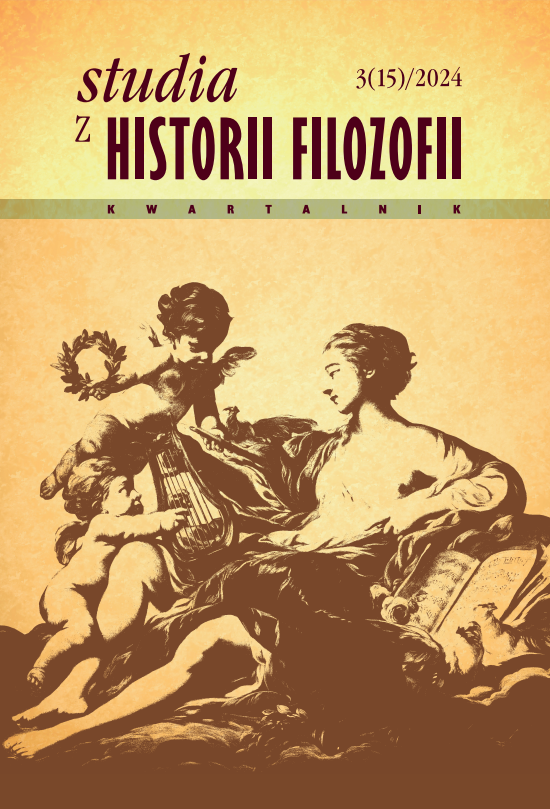Polite Social Practices in 18th-century Scotland
Place and Role of Elite Women
DOI:
https://doi.org/10.12775/szhf.2024.013Keywords
Scottish Enlightenment, Scottish social vision, polite society, elite women, social practices, cultural refinement, polite sociability, education and print cultureAbstract
This article explores the role and influence of elite women in 18th-century Scotland, focusing on their engagement with polite social practices during the Scottish Enlightenment. The Scottish Enlightenment, characterized by its integration of various disciplines and emphasis on both theoretical and practical knowledge, was a period of significant cultural intellectual development. Central to this movement was the concept of politeness, which shaped the social interactions of the elite and played a crucial role in their personal and societal advancement. Elite women were integral to the social fabric of this era, participating in mixed-gender activities and shaping the cultural landscape through their involvement in social gatherings, education, and print culture. Despite being formally excluded from public office and direct political power, these women exercised significant influence through social networks, family ties, and patronage, subtly navigating the political and intellectual currents of their time. The study highlights how these women, while adhering to socially accepted norms, found ways to circumvent formal exclusions, thereby contributing to the broader cultural and political life of Scotland. Their participation in polite sociability not only facilitated their integration into elite society but also played a vital role in the broader program of social improvement that characterized the Scottish Enlightenment. This article underscores the complex interplay between gender, power, and politics, revealing how elite women helped shape “The Golden Age” of Scotland through their engagement in polite social practices.
References
Berry Christopher J. 2013. The Idea of Commercial Society in the Scottish Enlightenment. Edinburgh: Edinburgh University Press.
Borsay Peter. 2003. “Politeness and Elegance: The Cultural Re-Fashioning of Eigh- teenth-Century York”. Eighteenth-Century York: Culture, Space and Society, ed. Mark Hallett, Jane Rendall, 1–20. York: University of York.
Emerson Roger L. 1988. “Science and the Origins and Concerns of the Scottish Enlightenment”. History of Science 26: 333–366.
Emerson Roger L. 2016. Essays on David Hume, Medical Men and Scottish Enlightenment: Industry, Knowledge and Humanity. London: Routledge.
Fordyce David. 2003 [1754]. The Elements of Moral Philosophy. Ed. Thomas D. Kennedy. Indianapolis: Liberty Fund.
Glover Katharine. 2011. Elite Women and Polite Society in Eighteenth-Century Scotland. Edinburgh: Edinburgh University Press.
Hanley Ryan Patrick. 2009. “Social science and Human Flourishing: The Scottish Enlightenment and today”. The Journal of Scottish Philosophy 7(1): 29–46.
Hanley Ryan Patrick. 2011. “Educational Theory and the Social Vision of the Scottish Enlightenment”. Oxford Review of Education 37(5): 587–602.
Home Henry, Lord Kames. 1782 [1781]. Loose Hints upon Education. 2nd ed. Edinburgh.
Hume David. 1995 [1741–1777]. Essays Moral, Political and Literary. Ed. Eugene F. Miller. Indianapolis: Liberty Fund.
Phillipson Nicholas. 1979. “Towards a Definition of the Scottish Enlightenment”. City and Society in the Eighteenth Century, ed. Paul Fritz, David Williams, 133–154. Toronto: Hakkert.
Smith Craig. 2009. “The Scottish Enlightenment, unintended consequences and the science of man”. The Journal of Scottish Philosophy 7(1): 9–28.
Turnbull George. 2003 [1742]. Observations upon Liberal Education. Ed. Terrence O. Moore, Jr. Indianapolis: Liberty Fund.
Wallace Mark C., Rendall Jane. 2021. Association and Enlightenment: Scottish Clubs and Societies, 1700–1830.
Lewisburg: Bucknell University Press.
Wawrzonkowski Krzysztof. 2016. “Dobre towarzystwo – rozwój smaku estetycznego w dobie Oświecenia”. In: Znaczenie filozofii Oświecenia. Człowiek wśród ludzi, ed. Barbara Grabowska, Adam Grzeliński, Jolanta Żelazna, 296–306. Toruń: Wydawnictwo Naukowe Uniwersytetu Mikołaja Kopernika
Downloads
Published
How to Cite
Issue
Section
License

This work is licensed under a Creative Commons Attribution-NoDerivatives 4.0 International License.
Stats
Number of views and downloads: 466
Number of citations: 0



